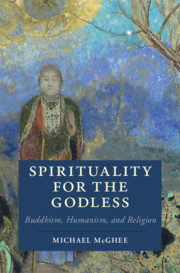Book contents
- Spirituality for the Godless
- Cambridge Studies in Religion, Philosophy, and Society
- Spirituality for the Godless
- Copyright page
- Dedication
- Epigraph
- Contents
- Acknowledgements
- A Shakespearean Prologue
- Introduction
- 1 ‘A Spiritually Enlightened Individual’
- 2 ‘The Resources of a Much Earlier Phase of the Tradition’
- 3 The Distractions of Baruch Spinoza
- 4 Immanuel Kant: ‘To Regard as Petty What We Are Otherwise Anxious About’
- 5 Wittgenstein’s Cool Temple
- 6 Rilke, Shakespeare … and a Little Freud
- 7 Concealment and Revelation
- 8 Mindfulness and the Form of a Philosophical Life
- 9 Epictetus: ‘The Beginning of Philosophy …’
- 10 Ted Hughes: Evaporation, Translation, Translocation
- 11 Philosophy as an Inventive Convergence of Methods
- 12 Richard Norman: ‘The Truths It Contains Are Human Truths’
- 13 Perspectives: Marmalade Stains on the Breakfast Table
- 14 David Hume: Wanting the Natural Sentiments of Humanity
- 15 ‘What is the Difference between Love and God’s Love?’
- 16 ‘Peace, Wild Wooddove, Shy Wings Shut’
- 17 ‘Only a Little Snivelling Half-Wit Can Maintain That’
- 18 ‘The World Is Too Much with Us’
- 19 Of Self and SELF, of Ātman and Anātman
- 20 ‘I Am Myself Alone’
- 21 The Five Heaps or Skandhas
- 22 ‘We Claim That There Is a Person, but We Do Not Say That He Is an Entity’
- 23 Birds, Frogs, and Tintern Abbey
- 24 Human Resources and Hubris
- References
- Index
11 - Philosophy as an Inventive Convergence of Methods
Published online by Cambridge University Press: 18 June 2021
- Spirituality for the Godless
- Cambridge Studies in Religion, Philosophy, and Society
- Spirituality for the Godless
- Copyright page
- Dedication
- Epigraph
- Contents
- Acknowledgements
- A Shakespearean Prologue
- Introduction
- 1 ‘A Spiritually Enlightened Individual’
- 2 ‘The Resources of a Much Earlier Phase of the Tradition’
- 3 The Distractions of Baruch Spinoza
- 4 Immanuel Kant: ‘To Regard as Petty What We Are Otherwise Anxious About’
- 5 Wittgenstein’s Cool Temple
- 6 Rilke, Shakespeare … and a Little Freud
- 7 Concealment and Revelation
- 8 Mindfulness and the Form of a Philosophical Life
- 9 Epictetus: ‘The Beginning of Philosophy …’
- 10 Ted Hughes: Evaporation, Translation, Translocation
- 11 Philosophy as an Inventive Convergence of Methods
- 12 Richard Norman: ‘The Truths It Contains Are Human Truths’
- 13 Perspectives: Marmalade Stains on the Breakfast Table
- 14 David Hume: Wanting the Natural Sentiments of Humanity
- 15 ‘What is the Difference between Love and God’s Love?’
- 16 ‘Peace, Wild Wooddove, Shy Wings Shut’
- 17 ‘Only a Little Snivelling Half-Wit Can Maintain That’
- 18 ‘The World Is Too Much with Us’
- 19 Of Self and SELF, of Ātman and Anātman
- 20 ‘I Am Myself Alone’
- 21 The Five Heaps or Skandhas
- 22 ‘We Claim That There Is a Person, but We Do Not Say That He Is an Entity’
- 23 Birds, Frogs, and Tintern Abbey
- 24 Human Resources and Hubris
- References
- Index
Summary
It is easy to think that the loss of religious belief was primarily a matter of intellectual attrition, dialectical engagement with arguments, scrutiny of the grounds of belief, and so on; the hoary monsters of Hume and Kant, of evolutionary theory and biblical criticism. But what poets like Hughes have emphasized here is the role of recalcitrant experience as a far more potent and destructive force than argument, and the role of a shattered imagination. It is the disorientation of the released prisoner who has to make sense of his new surroundings and to reappraise everything he had taken for granted, including the conditions of his former settled certitude. There are other aspects to philosophy than the dialectic, as I have sought to emphasize.
- Type
- Chapter
- Information
- Spirituality for the GodlessBuddhism, Humanism, and Religion, pp. 74 - 77Publisher: Cambridge University PressPrint publication year: 2021

